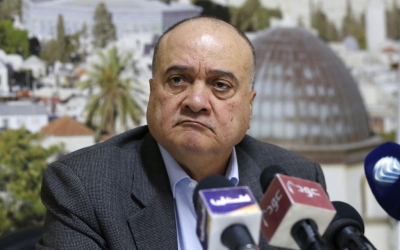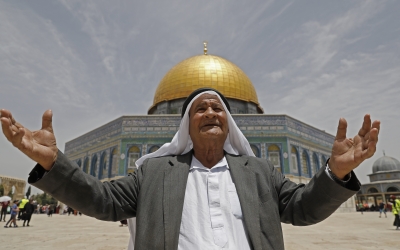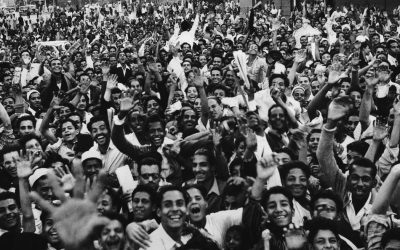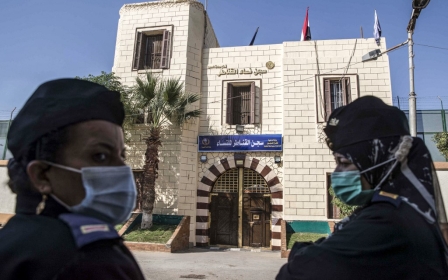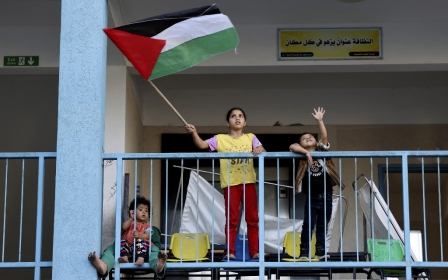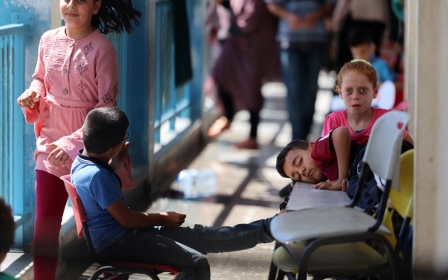Egypt restricts support for Palestine despite brokering Gaza truce

Over the past two weeks, Egypt's official response to the escalation of deadly violence in Israel-Palestine has sharply contrasted with its crackdown on support for the Palestinian cause at home.
The Egyptian government played a central role in the ceasefire reached early on Friday between Israel and Hamas, after 11 days of deadly hostilities, which have killed 12 people in Israel and 274 Palestinians in Gaza, the occupied West Bank and East Jerusalem.
Egypt has also been vocal in demanding calm in the occupied Palestinian territories since the beginning of Israel's crackdown on the East Jerusalem neighbourhood of Sheikh Jarrah and inside the al-Aqsa Mosque earlier in May.
The Egyptian foreign ministry issued repeated statements in which it denounced attacks by Israeli settlers on Sheikh Jarrah's Palestinian residents. The ministry also condemned the Israeli army and police for attacking Palestinians praying inside al-Aqsa Mosque and called on Israel to shoulder its responsibility for protecting civilians as an occupying force.
When violence flared between Israel and Gaza, Egypt sent a delegation to the Palestinian territory and then to Tel Aviv in its bid to convince the two sides to de-escalate.
Egyptian authorities also opened the Rafah border crossing with Gaza, the Palestinian territory's only window into the outside world while Israel keeps all its crossing points closed.
The opening of the crossing allowed a number of wounded Palestinians to cross over to the Egyptian side of the border to receive medical treatment at Egyptian hospitals.
Egyptian health authorities initially designated three medical facilities for responding to the needs of wounded Gazans arriving in Egypt, but then increased that number to 11, including four in the capital Cairo.
Meanwhile, Egyptian President Abdel Fattah el-Sisi has pledged $500m for the reconstruction of the Gaza Strip, vast parts of which have been devastated by deadly Israeli air strikes and shelling since 9 May.
Specialised Egyptian companies, the Egyptian president said on 18 May, would participate in the reconstruction of the besieged coastal enclave.
Sisi's gesture of financial support came only hours after his country sent 65 tonnes of medical supplies to Gaza, whose health facilities have struggled to keep up with the flow of victims from Israeli attacks and are close to running out of essential requirements.
Ban on support for Palestinians
In contrast to this official show of support to Gaza and attempts to bring attacks on the Palestinian territory to an end, Egypt does not allow the slightest expression of support for the Palestinians to be made on its streets.
A female journalist recounted on 14 April her painful experience of raising the Palestinian flag in downtown Cairo's iconic Tahrir Square.
Nourelhoda Zaki and a friend of hers raised the flag in support of the Palestinians. As a result, policemen detained Zaki and her friend for hours, verbally harassing and humiliating them before forcing them to drop the flag, leave the square altogether and pledge never to return for another show of support.
'On many occasions, Israel and the Palestinians preferred Egypt as a mediator to other regional players'
- Tarek Fahmi, politics professor
"Sorry to say, I believed the grand imam of al-Azhar is asking people around the world to back the Palestinians," Zaki wrote on her Facebook page, referring to the mosque in Cairo.
Nonetheless, other Egyptians are finding ways to evade this official intolerance to public support to the Palestinians, including on social media where numerous hashtags and support campaigns have gone viral.
The nation's celebrities have also joined in, including a budding actor who appeared on TV recently wearing a T-shirt on which the word "Palestinian" was written in Arabic.
Restoring regional influence
Recent events have opened up vast opportunities for Cairo to retain its status as a regional powerhouse, one it almost lost to other regional players because of the unrest permeating it following the 2011 uprising against longstanding president Hosni Mubarak, political analysts said.
"For a long time after 2011, Egypt was busy solving its internal problems, which negatively affected its regional influence," Tarek Fahmi, a political science professor at Cairo University said.
Egypt has always had leverage over the Palestinians and Israelis. It was the first Arab state to sign a peace deal with Israel. It maintained close relations with Israel, even when other Arab states had no relations with it. In recent years, Egypt has coordinated security in its Sinai Peninsula with Israel. It also welcomed the series of normalisation deals Israel signed with a slew of Arab states, including the United Arab Emirates, Bahrain and neighbour Sudan.
Over the years, Egypt has used its close links with the Palestinian Authority and almost all Palestinian factions to ensure Israelis had a formidable Palestinian negotiating bloc.
"These close links ensured that Cairo would have leverage over the two sides," Fahmi said. "On many occasions, Israel and the Palestinians preferred Egypt as a mediator to other regional players."
This leverage also derives from Egypt's importance as an Arab state. Egypt fought four wars against Israel and for many years in the past, it was seen as the home of Arab nationalism and a symbol of liberation from colonialism.
In the last few years, Cairo has nurtured ties with Hamas and most other factions in Gaza, having sponsored many rounds of inter-Palestinian reconciliation talks on the road to bringing Gaza and the occupied West Bank together.
Egypt longs to reassert regional influence, especially with a new US president, Joe Biden, now in office.
"Egypt's aspired success in brokering a ceasefire between Gaza and Israel will eventually make the administration of US President Joe Biden view it positively and assert Cairo's importance as a peace broker in the region," Wasim Fakhry, a member of the parliamentary Committee on Foreign Relations, told MEE prior to Friday's ceasefire announcement.
The presence and absence of the Brotherhood
Cairo views the Gaza-ruling Hamas as an ideological offshoot of the Muslim Brotherhood, the movement of late president Mohamed Morsi, one on which Sisi's regime has cracked down on internally and regionally.
Most of the Brotherhood's leaders are now in jail, but still the organisation has a following on the streets, especially in the Egyptian countryside in the Nile Delta.
Decision-makers in Egypt's security establishment apparently believe that any show of support for the Palestinians on Egypt's streets will bring the Muslim Brotherhood and other Islamists back to the political stage by giving them the chance to rally support for one of their main causes: Palestine.
In the face of this stand Egypt's tradition of repressive anti-protest laws. A law currently in place bans peaceful assembly and makes it necessary for those who want to stage protests to acquire approval from the security establishment.
"The law prevents people from staging protests in support of the Palestinians like people in other countries do," rights advocate Negad al-Borae told MEE.
A large number of the nation's political activists are now in jail on charges of violating the Protest Law.
The law prevents the assembly of more than two people without approval from the interior ministry. Egypt also has an emergency law in place since 2013, which gives authorities exceptional powers, some of them used in crushing the opposition.
"These laws deter the public from expressing themselves on the streets," al-Borae said. "However, nobody knows how long people will stay silent or afraid."
Middle East Eye propose une couverture et une analyse indépendantes et incomparables du Moyen-Orient, de l’Afrique du Nord et d’autres régions du monde. Pour en savoir plus sur la reprise de ce contenu et les frais qui s’appliquent, veuillez remplir ce formulaire [en anglais]. Pour en savoir plus sur MEE, cliquez ici [en anglais].


